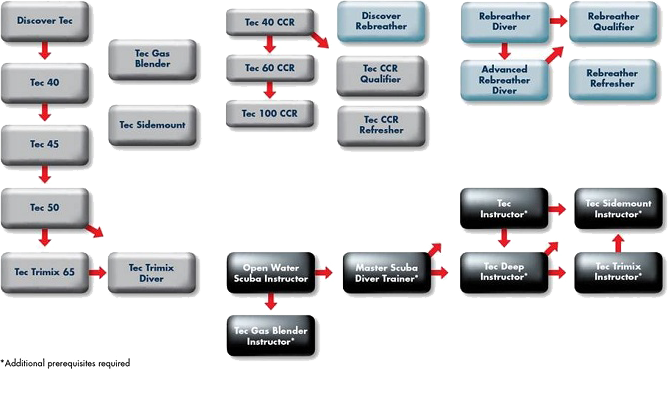You have 0 product(s) in your cart.
The Path To Your Tec Career
Learn about technical diving and get to try it out.
Technical Diving
Technical diving is scuba diving’s “extreme” sport, taking experienced and qualified divers far deeper than in mainstream recreational diving. Technical diving is marked by significantly more equipment and training requirements to manage the additional hazard this type of diving entails. Tec diving isn’t for everyone, but for those who hear its challenge call, the PADI TecRec courses are the answer.
If you are interested in Tec diving please speak with our PADI Course Director and Tec Instructor Trainer, Mick Todd.

What is technical diving?
Technical scuba diving is defined as diving other than conventional commercial or research diving that takes divers beyond recreational scuba diving limits. It is further defined as and includes one or more of the following:
Because in technical diving the surface is effectively inaccessible in an emergency, tec divers use extensive methodologies and technologies and training to manage the added risks. Even with these, however, tec diving admittedly has more risk, potential hazard and shorter critical error chains than does recreational scuba diving.
How long has technical diving been around?
Most people would agree that cave diving is a form of technical diving. Cave diving developed in the late 1960s and 1970s, developing into a discipline largely like it is today by the mid 1980s. In the early 1990s, several groups of divers around the world began experimenting with technologies for deep diving (beyond recreational limits) to explore both caves and wrecks. These communities united and emerged as “technical diving” or “tec diving” with the publication of aquaCorps (no longer in print), which dedicated itself to this type of diving. Since then, tec diving continues to develop both in scope and in its technologies.
Why would I want to be a tec diver?
Tec diving not only has more risk, but it requires significantly more effort, discipline and equipment. It’s not for everyone, and you can be an accomplished, avid top-notch diver your entire life without making a tec dive.
That said, there’s a cadre of individuals who want to visit places underwater that relatively few people can. Many spectacular, untouched wrecks lie at depths well below 40 metres/130 feet. Deep reefs have organisms you don’t find in the shallows. Some people enjoy the challenge and focus tec diving requires. Still others love being involved with cutting edge technologies. These reasons make tec diving rewarding.
The PADI TecRec Difference
The TecRec program debuted in 2000. Although TecRec is not the first tec diving program (cave diver training has been around for decades), it repeatedly receives accolades for its merits.
The Scuba Gear You'll Use
Tec diving uses much more equipment than recreational diving. The technical scuba gear typically uses two to four or five regulators, a dive computer, and some accessories.
Check with us about the gear you need for this course.
Prerequisites
TecRec prerequisites vary (see individual course descriptions), but the following applies to anyone interested in technical diving. You must be
The Fun Part
The fun part of TecRec is rising to the challenges as you dive deeper and longer than most divers ever do.